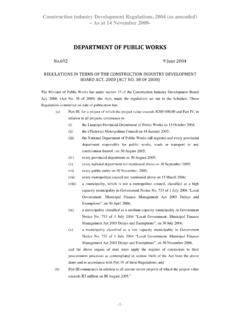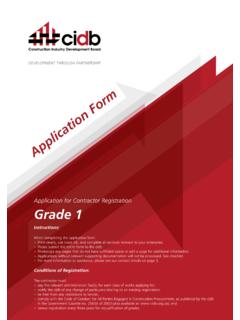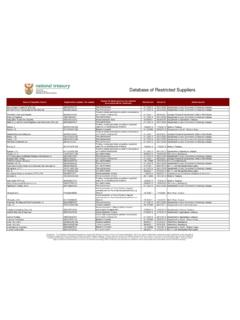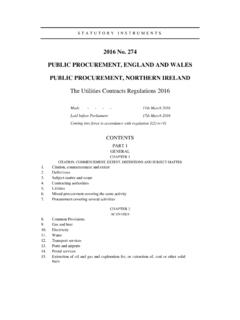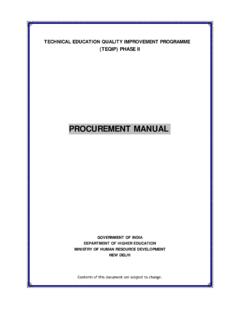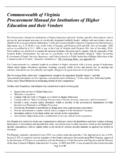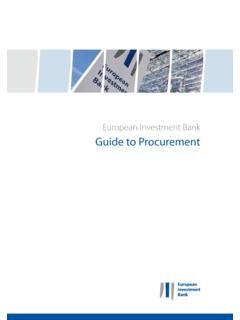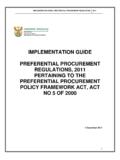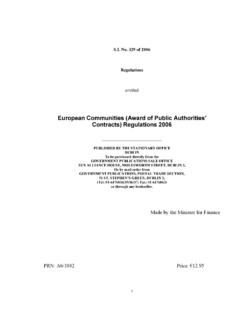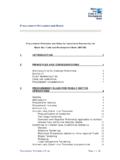Transcription of Applying the procurement prescripts of the CIDB …
1 Best Practice Guideline A2: Applying the procurement prescripts of the CIDB Act in the public Sector Page 1 December 2007: Edition 5 The Construction Industry Development Board Act (Act 38 of 2000) defines the construction industry as: the broad conglomeration of industries and sectors which add value in the creation and maintenance of fixed assets within the built environment. The Construction Industry Development Regulations issued in terms of this Act defines construction procurement as: procurement in the construction industry, including the invitation, award and management of contracts . Accordingly, construction procurement involves not only engineering and construction works contracts, but also supplies contracts that involve the purchase of construction materials and equipment, services relating to any aspect of construction including professional services, disposals of surplus materials and equipment and disposals in the form of demolitions.
2 The primary pieces of national legislation that govern procurement are as listed in Table 1 (see Annexures 1 and 2). Figure 1 presents an overview of the regulatory framework for procurement and supply chain The basic philosophy underlying the approach to the public Finance Management Act is to allow managers to manage and be held accountable, while politicians are provided with information necessary to set overall policy and priorities for service delivery. This Act, which is applicable to all organs of state other than municipalities and municipal entities, requires accounting officers (head of departments / chief executive officers) and accounting authorities (board / controlling body / chief executive officer) to have in place an appropriate procurement and provisioning system which is fair, equitable, transparent, competitive and cost effective; effective, efficient and transparent systems of financial and risk management and internal control; and a system for properly evaluating all major capital projects prior to a final decision on the project.
3 The approach to regulating supply chain management in municipalities and municipal entities through the Municipal Finance Management Act is similar to that contained in the public Finance Management Act whereby accounting officers / authorities are tasked with the responsibility of establishing within their institutions a supply chain management system that is consistent with a broad framework and norms and standards established by National Treasury. 1 Tender Board Acts at both the national and provincial level are in the process of being repealed. They are accordingly not shown in Table 1 or Figure 1. CONSTRUCTION procurement BEST PRACTICE GUIDELINE #A2 Applying the procurement prescripts of the CIDB in the public Sector December 2007 Fifth Edition of CIDB document 1002 Construction Industry Development Board Pretoria - Head OfficeTel: 012 482 7200 Fraudline: 0800 11 24 32 Call Centre: 0860 103 353 E-mail: 1.
4 Introduction Best Practice Guideline A2: Applying the procurement prescripts of the CIDB Act in the public Sector Page 2 December 2007: Edition 5 Table 1: Primary pieces of legislation that regulate procurement Act Applicability What it does in respect of procurement / supply chain management Constitution of the Republic of South Africa, 1996 (Act No 108 of 1996) All organs of state Provides procurement objectives and establishes government s policy for preferencing public Finance Management Act, 1999 (Act 1 of 1999) All organs of state, except in the local sphere of government Establishes broad framework within which accounting officers / authorities must establish their procurement and provisioning system (supply chain management) Preferential procurement Policy Framework Act, 2000 (Act No 5 of 2000) All organs of state (state owned enterprises) at discretion of Minister) Establishes the manner in which preferential procurement policies are to be implemented Local Government.
5 Municipal Finance Management Act, 2003 (Act No 56 of 2003) Municipalities and municipal entities Establishes a detailed regulatory framework for supply chain management. Local Government Municipal Systems Act, 2000 (Act No 32 of 2000); and Local sphere of government Establishes a framework for the establishment of service delivery agreements involving competitive bidding processes Construction Industry Development Board Act, 2000 (Act 38 of 2000) All organs of state involved in procurement relating to the construction industry. Establishes a means by which the Board can promote and implement policies, programmes and projects aimed at procurement reform, standardisation and uniformity in procurement documentation, practices and procedures within the framework of the procurement policy of government. Establishes a national register of contractors (and if required, consultants and suppliers) to manage public sector procurement risk Broad-Based Black Economic Empowerment Act, 2003 (Act No.)
6 53 of 2003). procurement provisions apply to all organs of state. Establishes a code of good practice to inform the: development of qualification criteria for the issuing of licenses or concessions, the sale of state owned enterprises and for entering into partnerships with the private sector; and development and implementation of a preferential procurement policy. Prevention and Combating of Corrupt Activities Act, 2004. (Act No. 12 of 2004). public and private sector Makes corruption and related activities an offence. Establishment a Register in order to place certain restrictions on persons and enterprises convicted of corrupt activities relating to tenders and contracts; and Places a duty on certain persons holding a position of authority to report certain corrupt transactions. In the Municipal Finance Management Act, accounting offers are responsible to take all reasonable steps to ensure that proper mechanisms and separation of duties in the supply chain management system are in place to minimize the likelihood of fraud, corruption, favoritism and unfair irregular practices and for implementing the supply chain management policy of the municipality or municipal entity in accordance with a prescribed regulatory framework for supply chain management, issued by the Minister of Finance that covers at least the following: The range of supply chain management processes that municipalities and municipal entities may use, including tenders, quotations, auctions and other types of competitive bidding.
7 When a municipality or municipal entity may or must use a particular type of process. Procedures and mechanisms for each type of process. Procedures and mechanisms for more flexible processes where the value of a procedure is below a prescribed amount. Open and transparent pre-qualification processes for tenders or other bids. Competitive bidding processes in which only pre-qualified persons may participate. Bid documentation, advertising of and invitations for contracts. Procedures and mechanisms for: o the opening, registering and recording of bids in the presence of interested persons; o the evaluation of bids to ensure best value for money; o negotiating the final terms of contracts; and o the approval of bids. Screening processes and security clearances for prospective contractors on tenders or other bids above a prescribed Compulsory disclosure of any conflicts of interests prospective contractors may have in specific tenders and the exclusion of such prospective contractor from those tenders or bids Best Practice Guideline A2: Applying the procurement prescripts of the CIDB Act in the public Sector Page 3 December 2007: Edition 5 Participation in the supply chain management system of persons who are not officials of the municipality or municipal entity.
8 The barring of persons from participating in tendering or other bidding processes, including persons: Application: national and provincial departments, constitutional entities, and national and provincial public entitiesConstitution of the Republic of South AfricaWhen an organ of state contracts for goods or services, it must do so in accordance with a system which is fair, equitable, transparent, competitive and cost-effective. Local Government: Municipal Finance Management Act The accounting officer of a municipality / municipal entity must ensure that there is in place a supply chain management policy in accordance with the provisions of a regulatory framework and that this policy is implemented in a way that is fair, equitable, transparent, competitive and cost-effective. public Finance Management Act The accounting officer / authority must ensure that the organ of state has and maintains an appropriate procurement and provisioning system which is fair, equitable, transparent, competitive and cost-effective.
9 Application: national and provincial departments, constitutional entities, national and provincial public entities, major public entities, and national government enterprises Application: municipalities and municipal entities Regulatory Framework for Supply Chain Management Treasury Regulation 16 ( public -private partnerships) procurement documentation relating to the construction industry Notes: 1) The Construction Industry Development Regulations define construction procurement as procurement in the construction industry, including the invitation, award and management of contracts . Construction procurement covers supplies, services, works and disposals within the construction industry. 2) The Preferential procurement Policy Framework Act and certain other Acts which impact upon aspects of procurement are not shown. Figure 1: The Regulatory Framework for procurement in South Africa Construction Industry Development Board Act Construction Industry Development Regulations which , inter alia, provides for a register of contractors and a register of projects Standard for Uniformity in Construction procurement Code of Conduct for the Parties Engaged in Construction procurement Application.
10 All organs of state only in respect of construction procurement Construction procurement Local Government Municipal Systems Act Conditions and requirements for the provisions of municipal services by external mechanisms Regulatory Framework for municipal supply chain management and / or private public partnerships, framework for unsolicited bids, competency levels of officials and framework for the transference of assets prescribed by the Minister of Finance National Treasury Instructions Relevant Provincial Treasury Instructions Construction procurement Best Practices Best Practice Guideline A2: Applying the procurement prescripts of the CIDB Act in the public Sector Page 4 December 2007: Edition 5 o who were convicted for fraud or corruption during the past five years: o who willfully neglected, reneged on or failed to comply with a government contract during the past five years; o whose tax matters are not cleared by South African Revenue Service Measures for: o combating fraud, corruption, favouritism and unfair and irregular practices in supply chain management o promoting ethics of officials and other role players involved in municipal supply chain management The invalidation of recommendations or decisions that were unlawful, improperly made, taken or influenced, including recommendations or decisions that were made, taken or in any way influenced by- o councilors in contravention of item 5 or 6 of the Code of Conduct for Councilors set out in Schedule 1 to the Municipal Systems Act; or o municipal officials in contravention of item 4 or 5 of the Code of Conduct for Municipal Staff Members set out in Schedule 2 to that Act: The procurement of goods and services by municipalities or municipal entities through contracts procured by other organs of state.
